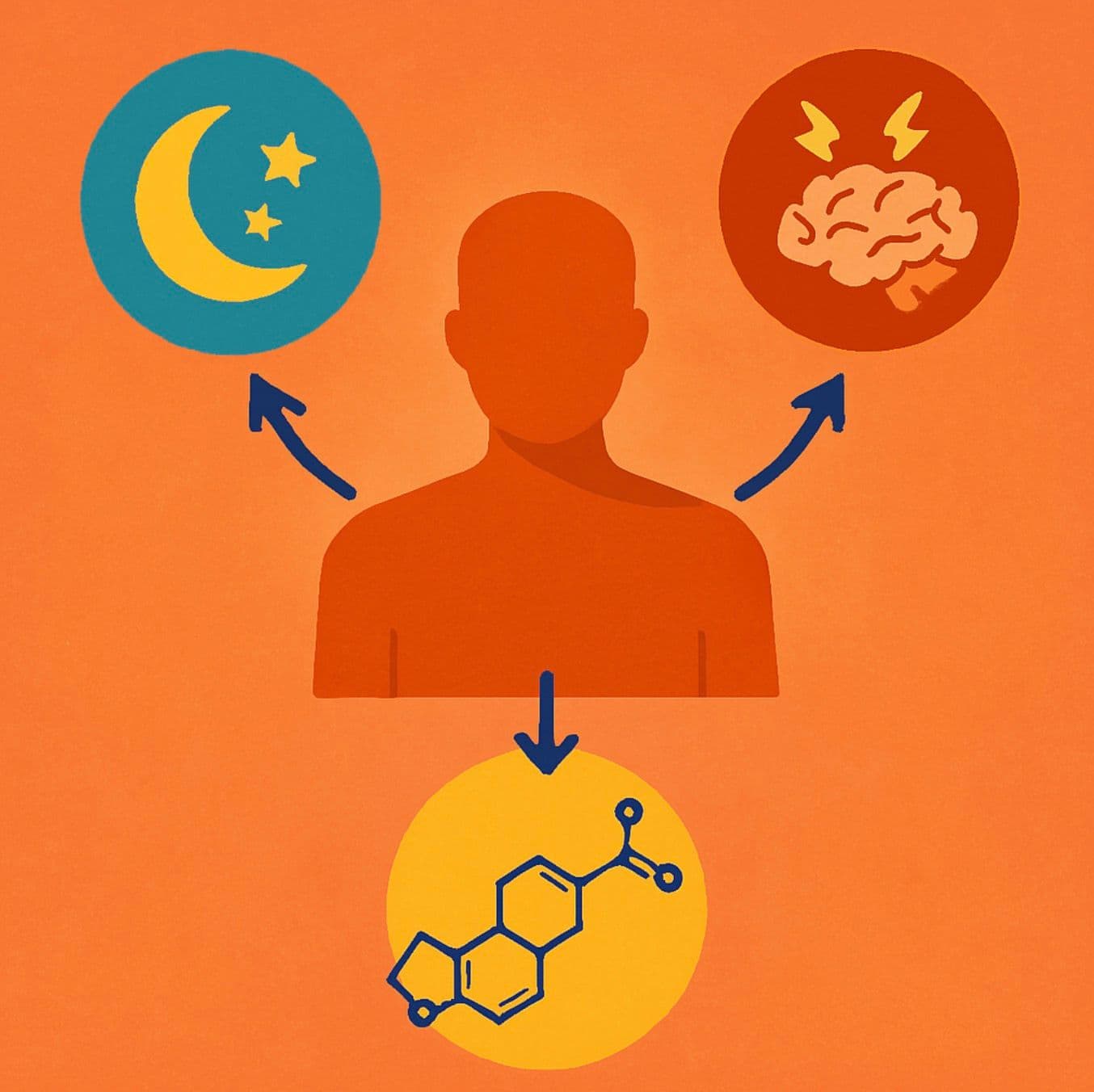Testosterone, Sleep, and Stress: Why It’s All Connected
Published on:
Updated on:

People are asking...
i’ve been on compounded cream for 3 weeks. twice daily to scrotum. i am having difficulty sleeping but also started thyroid. is the thyroid medication...
In general Testosterone helps with sleep rather than hinders it, it's one of the big benefits that we talk about with patients looking to start TRT. It can take 7-8 weeks to totally stabilize when fir... See Full Answer
Can you discuss the phenomena of veterans experiencing low T from PTSD? Is this a legitimate thing?...
So, PTSD in and of itself does not cause low testosterone. However, veterans are at risk of hypogonadism for many reasons that often coincide with PTSD. So, first is that many environmental exposures ... See Full Answer
Why does testosterone increase my anxiety ?...
Most men who use testosterone actually report a decrease in anxiety. We have seen that men who use testosterone that aromatize to excess (ie convert the testosterone to estrogen) are the ones who comp... See Full Answer
Have a question? Ask us.
At AlphaMD, we're here to help. Feel free to ask us any question you would like about TRT, medical weightloss, ED, or other topics related to men's health. Or take a moment to browse through our past questions.
When it comes to optimizing testosterone, most guys focus on the obvious: injections, gels, or pellets. But there’s a huge part of the equation many overlook — your lifestyle.
Your body isn’t just a chemistry set. It’s a delicate system, and testosterone levels are influenced by more than what’s in a syringe. In fact, two of the biggest factors are hiding in plain sight: sleep and stress.
Let’s break it down.
😴 Sleep: Your Natural T-Booster
Testosterone is mostly produced while you sleep — especially during deep, restorative stages. So if you’re burning the candle at both ends or waking up all night? That’s a recipe for low T.
In one study, men who slept less than 5 hours per night saw their testosterone levels drop by 10-15% in just one week.
Quick tip: Aim for 7–9 hours of quality sleep. Wind down early, avoid screens before bed, and keep your bedroom cool and dark.
😤 Stress: The Silent T-Killer
Chronic stress floods your body with cortisol, a hormone that directly suppresses testosterone production. In survival mode, your body isn’t interested in building muscle or optimizing libido — it’s just trying to get through the day.
Even worse? High cortisol can wreck your sleep, creating a vicious cycle that tanks your T even more.
Quick tip: Build in daily stress management. Try breathwork, walking, strength training, or simply unplugging for a few hours.
🔁 The Vicious Cycle
Poor sleep raises cortisol. High stress disrupts sleep. Both crush testosterone. Low T leads to more fatigue and irritability… which makes sleep and stress worse.
It’s a loop — and the only way out is to address all three.
✅ Small Fixes, Big Impact
Even if you’re on TRT, your lifestyle habits still matter. Dialing in your sleep and managing your stress can help your body respond better to treatment — and help you actually feel the benefits you’re aiming for.
Think of it this way: TRT is the foundation, but your habits are the fuel.
Have a question? Ask us.
At AlphaMD, we're here to help. Feel free to ask us any question you would like about TRT, medical weightloss, ED, or other topics related to men's health. Or take a moment to browse through our past questions.
People are asking...
i’ve been on compounded cream for 3 weeks. twice daily to scrotum. i am having difficulty sleeping but also started thyroid. is the thyroid medication...
In general Testosterone helps with sleep rather than hinders it, it's one of the big benefits that we talk about with patients looking to start TRT. It can take 7-8 weeks to totally stabilize when fir... See Full Answer
Can you discuss the phenomena of veterans experiencing low T from PTSD? Is this a legitimate thing?...
So, PTSD in and of itself does not cause low testosterone. However, veterans are at risk of hypogonadism for many reasons that often coincide with PTSD. So, first is that many environmental exposures ... See Full Answer
Why does testosterone increase my anxiety ?...
Most men who use testosterone actually report a decrease in anxiety. We have seen that men who use testosterone that aromatize to excess (ie convert the testosterone to estrogen) are the ones who comp... See Full Answer
Get $30 off your first month’s order
Enter your email address now to receive $30 off your first month’s cost, other discounts, and additional information about TRT.
Legal Disclaimer
This website is a repository of publicly available information and is not intended to form a physician-patient relationship with any individual. The content of this website is for informational purposes only. The information presented on this website is not intended to take the place of your personal physician's advice and is not intended to diagnose, treat, cure, or prevent any disease. Discuss this information with your own physician or healthcare provider to determine what is right for you. All information is intended for your general knowledge only and is not a substitute for medical advice or treatment for specific medical conditions. The information contained herein is presented in summary form only and intended to provide broad consumer understanding and knowledge. The information should not be considered complete and should not be used in place of a visit, phone or telemedicine call, consultation or advice of your physician or other healthcare provider. Only a qualified physician in your state can determine if you qualify for and should undertake treatment.
